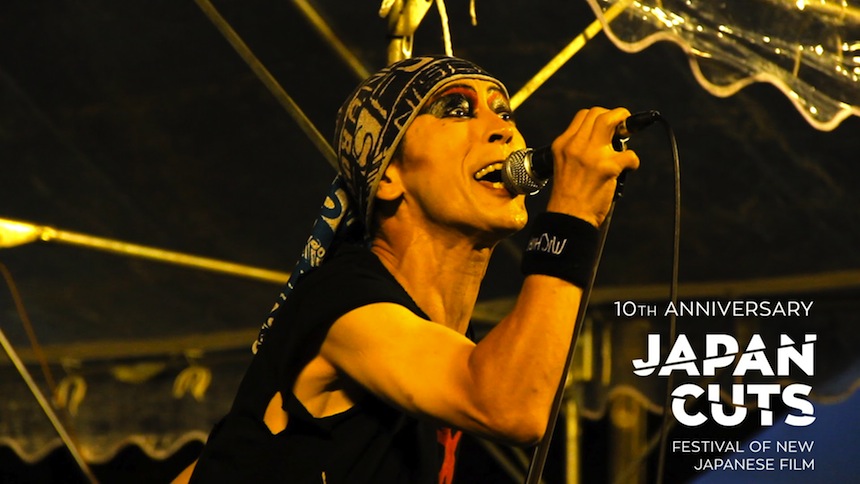
MOTHER, I'VE PRETTY MUCH FORGOTTEN YOUR FACE
Michiro Endo, once the frontman of Japanese punk group Stalin, turned 60 in 2011. He decided to travel all around Japan and make a movie. Turning 60 in Japan, which is called called kanreki, has a special meaning. They consider the birthday as the day of your rebirth. That you are a newborn into the world again.
While touring and performing solo and with a group, Fukushima happens. Being a Fukushima native and that hasn't visited his mother regularly, Endo journeys back to his hometown with a Geiger counter. With other musicians, Endo creates Project Fukushima! and launches the festival on August 15, 2011. 'Japan suffered 2 atomic bombs (on August 15), and one nuclear meltdown- the latter one was our own fault' Endo explains, 'that maybe the way we lead our country after the war wasn't really right.' The festival was not to make Fukushima another place with a forever negative connotation.
Mother is a documentary of not only a poignant personal journey but a hopeful reflection of Japan after such national disaster. Endo cites small radio stations popping up amidst disasters, connecting people, young and old, people getting together and influencing each other. He's still kicking ass on stage though. His guttural, expletive filled screams against imperialists, parents and capitalism still resonate. -- Dustin Chang
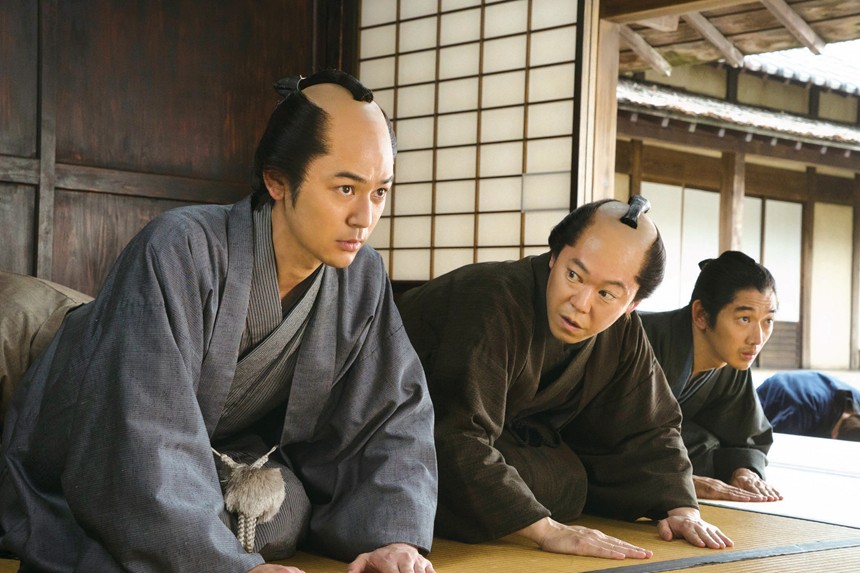
THE MAGNIFICENT NINE
This comic period drama is another winner from director Yoshihiro Nakamura (Fish Story, A Boy and His Samurai), with gentle humor and colorful characters juiced with the politically inspiring example of folks banding together to fight the powers that be.
The title refers to a group of merchants and farmers in 18th century Japan who get together to try to relieve their oppressive situation of onerous land taxes and having to shoulder the burden of expenses for transporting goods to their lord. Their solution: raise a large amount of money to their cash-strapped lord and use the interest they charge to enrich their town and ease their financial burdens. The rub is that this plan could very well be considered treasonous and possible have them beheaded.
Boasting a large cast which includes several of Japan’s finest actors – Satoshi Tsumabuki, Eita, Ryuhei Matsuda, Yuko Takeuchi – The Magnificent Nine unfolds with tremendous flair and wit, as the decades-long execution of the town’s plan to engineer their financial and political liberation is presented to us. It’s full of the great humor and heart we’ve come to expect from the great director Nakamura. -- Christopher Bourne

ARTIST OF FASTING
Masao Adachi, one of the key figures of the Japanese New Wave and definitely the most radical of the bunch, had to live most of his adult life in hiding because of his associations with the Japanese Red Army, a radical communist student group which took up armed struggle in Lebanon. Even after extradited to Japan in 2000 on some trumped up passport violation charges, the controversial writer/director still kept on making films. His turbulent past has been a subject of many adoring western filmmakers over the years (It Maybe that Beauty Has Strengthened Our Resolve, 27 Years Without Images). At age 77, marooned forever in Japan (Japanese gov refuses to issue him a passport), he turns his attention to contemporary Japan, the country in the midst of prolonged economic stagnation and reeling from Fukushima, where the militarism he was so opposed to is once again rising.
With that background, Artist of Fasting is more a full blown, not so subtle protest against Japan's rising militarism than a movie, equipped with the footage of the Fukushima disaster, dying third world children, war atrocities, etc. His 'pinku eiga' background also comes to the fore with schoolgirl nudity and rape which will surely raise some eyebrows of modern movie going audiences. Appropriating Kafka's "The Hunger Artist", Adachi tells a parable of a misunderstood man: our silent hero (Hiroshi Yamamoto) decides to sit down in the middle of the shopping district and fast. He is a non-emotive man, an empty vessel that everyone can reflect their desires upon. He soon becomes a media sensation and thoroughly exploited by 'entertainment' industry which puts him in a cage adorned with the infamous 'rising-sun' flags for arousing nationalistic fervor. The film ultimately raises a big middle finger to powers that be- current Abe government, religion, media, military, yakuza and just about everyone. -- Dustin Chang
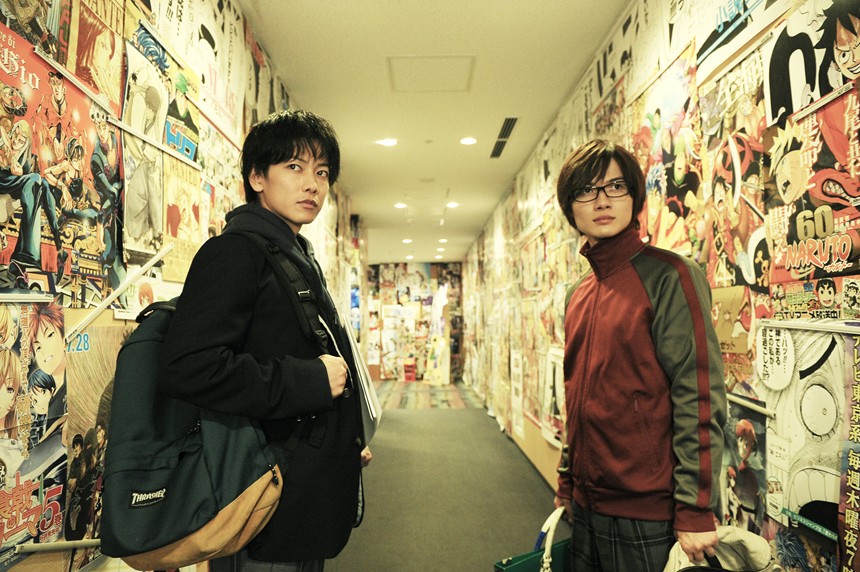
BAKUMAN
Two high school students strive to make it in the cutthroat, dog-eat-dog world of the manga publishing industry in Hitoshi One’s Bakuman, which delves deeply in the details of both the commercial realities of the marketplace (where reader response is king), and the actual creation of manga, down to the different pens used for line shadings.
Our heroes are Moritaka Mashiro aka Saiko (Takeru Satoh) and Akito Takagi aka Shujin (Ryunosuke Kamiki), a budding illustrator and a writer respectively who team up to storm the citadel that is Weekly Shonen Jump, the top manga magazine in Japan. Saiko has long showed talent for illustration, and grew up around this milieu, his uncle having been a popular manga artist. But after seeing his uncle literally being worked to death, he’s been loath to pursue it.
But as is often the case with boys his age, he gets the motivation he needs from the attentions of a girl, his beautiful classmate Azuki (Nana Komatsu), who herself has a career goal of becoming an anime voiceover artist. With that, Saiko and Shujin submit themselves to the grueling process of getting into Shonen Jump magazine, with the help of a friendly editor (Takayuki Yamada) who sees their talent early on and encourages them. The goal of both these aspiring students and the regular writers is to gain the approval of their imperious chief editor (Lily Franky).
Bakuman was originally a manga, which was itself published in Weekly Shonen Jump. Therefore, at least a couple levels of meta are lost in translation to cinematic form. Still, this is a winning, visually accomplished story of talented underdogs striving against all odds at success in their chosen art. -- Christopher Bourne
BURST CITY
Without Gakuryu Ishii's seminal Burst City, there would have been no Tetsuo: The Iron Man, no Wild Zero and no Japanese cyberpunk culture in the years to come. With his new film Bitter Honey playing at this year's Japan Cuts, this cult classic is making a North American theatrical debut and is a not to be missed! Never mind its almost incomprehensible narrative. But there are enough metal attire and rusty weapons to give you tetanus just by watching it. Starring who's who in punk rockers of the day (The Rockers, The Roosters, The Stalin, etc), this frenetic, handheld filmmaking is a dizzying mixture and excess of energy, attitude and absurdity, recalling anywhere from Mad Max to Rebel Without a Cause. It's mad fun! -- Dustin Chang

BITTER HONEY
A fantasy love story set in post-war Japan, Gakyuru Ishii's Bitter Honey is a beautiful accomplishment in filmmaking. Loosely based on Saisei Muro's book of the same name, the film tells an old dying writer Saisei (Ren Osugi) and his very unusual muse, Akako (Fumi Nikaido), a goldfish named after her bright red color. Living with his bedridden wife for 19 years, Sai finds an inspiration in the company of child-like Akako, a ¥300 goldfish he bought from a sage-like fishmonger (Masatoshi Nagase), who says the fish has an ass like "Brigitte Bardot". Their love is consummated by her being swallowed whole by Sai, then swimming back up to his mouth. There are many double entendres to be had in her torn tail and him fixing it with his saliva and what not. But Ishii keeps everything classy with immaculate period set design, slick camera movement and fully committed acting from both Osugi and Nikaido. This balance is the key success of Bitter Honey.
Nikaido, always in her red dress with long billowy tail, prancing around making funny faces, somehow makes this muse of a writer who-is-a-goldfish work. She is naive, coquettish, emotional, defiant and more. Her Akako turns out to be a writer's creation he can't control. She turns out to be a thoroughly three dimensional character.
It was his psychological thriller Angel Dust that introduced me to Gakuryu Ishii (then Sogo Ishii). His masterful formalism and haunting images made an indelible mark in my brain. Bitter Honey is filled with equally stunning imagery. Coming from underground punk filmmaking, Ishii came a long way to direct such a mature and masterful film without ever losing a sense of wonder. -- Dustin Chang
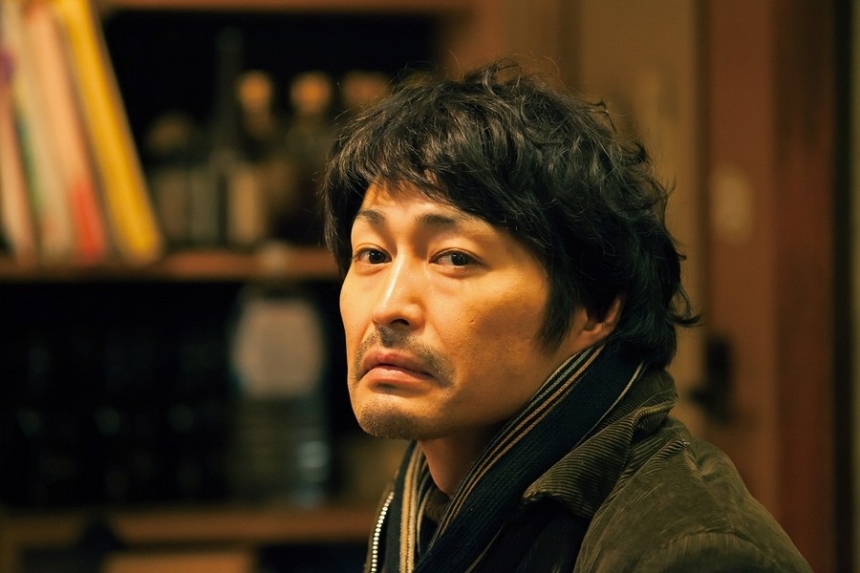
THE ACTOR
Ken Yasuda plays the title role, a bit actor named Kameoka. He is one of those actors who you might recognize from countless movies but don't know the name. But Kameoka is a hard working fellow, whatever the role he takes - in yakuza or samurai films, he gives it his all. His craft always gets recognized by his peers and filmmakers alike. When it comes to his work, he is a real professional. But in life, he is a lonely, quiet, single man. After meeting an attractive single mother (alluring Kumiko Aso) at her small restaurant while on on the road for a film shoot, Kameoka has to reconsider what it means to be an actor in his own life.
It's good to see Satoko Yokohama's work again. Her goofy, good natured and highly original Bare Essence of Life was one of my favorites from Japan Cuts 2010. Here again, her unhurried, low-key film about an actor going about his life is a completely unpretentious, agenda-less experience. There is nothing meta about The Actor despite its movie(s) within a movie premise, or actor playing an actor playing an actor. Veteran TV actor Yasuda with his sad, well-worn clown face gives a fine tuned, melancholic performance. It's his likability that makes the film. And we can't stop rooting for Kameoka's awkward attempt at romance. Even with the use of stage and goofy rare projections, nothing juts out in The Actor. Everything is well-rounded and tranquil. It's also very hard to categorize Yokohama's film one way or the other. It could be seen as many things or could be very simple. There are many humorous moments in this albeit hushed, but never laugh out loud funny. I guess can be called a dramedy that puts a big smile on your face the whole time you are watching it. Yokohama is a rare, distinctive voice in a current Japanese cinema. -- Dustin Chang
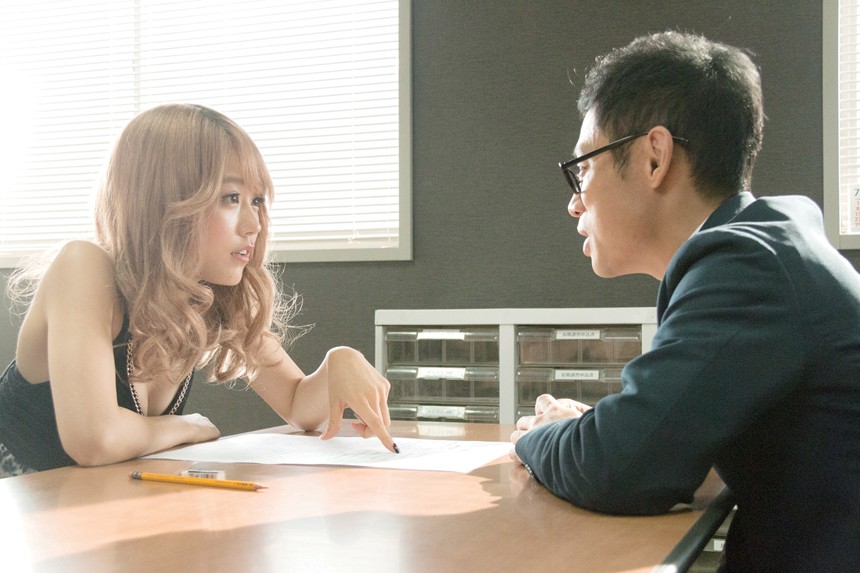
FLYING COLORS
Sayaka (Kasumi Arimura), as a little girl, had a lot of trouble making friends at school, constantly being bullied and ostracized, compelling her to change schools often. But with the encouragement and unyielding advocacy of her indulgent mom (Yo Yoshida), she finally settles into a nice school, where she finally is able to gather an entourage of friends to party with. The unfortunate side effect of Sayaka’s success at socializing is that now she has become a bubble-headed super-underachiever whose prospects for future life and career success are just this side of nil. After she’s expelled from school for being caught with cigarettes and refusing to rat out her friends, she ends up at a last-chance cram school, where her passionate instructor (Atsushi Ito) doggedly unlocks the potential for academic achievement she has been hiding beneath her blonde locks and short skirts. Sayaka’s even encouraged to dream the impossible dream: getting into Keio University, one of Japan’s top private universities and one of the toughest to get into.
Sayaka’s cram school teacher’s favorite saying is “Where there’s a will, there’s a way.” Though that may be a cliché, that doesn’t make the statement any less true. And even though Nobuhiro Doi’s film may also itself be a big cliché – although apparently the character of Sayaka is based on a real person – damned if it doesn’t win you over with its immense charm, much of it due to the bubbly presence of Arimura’s performance. -- Christopher Bourne



















